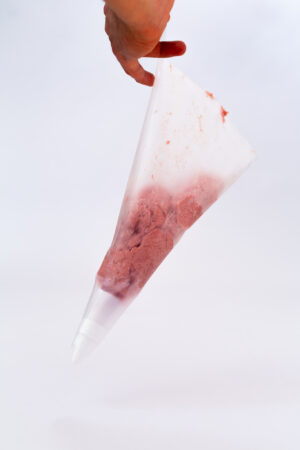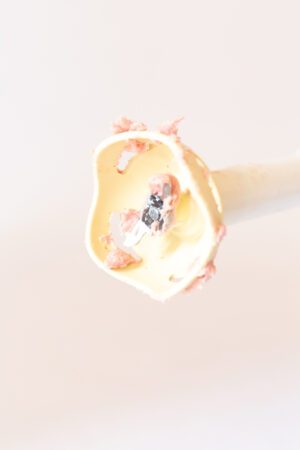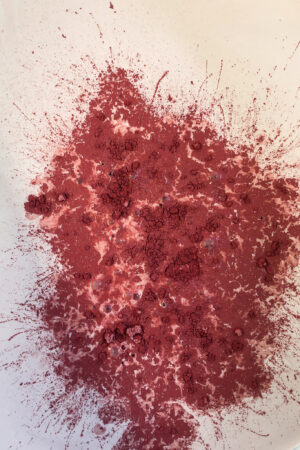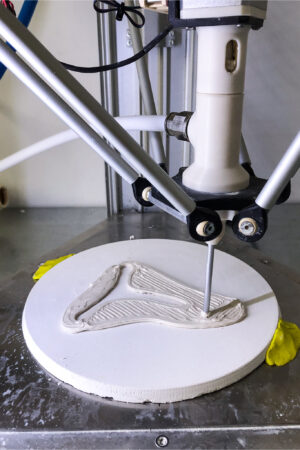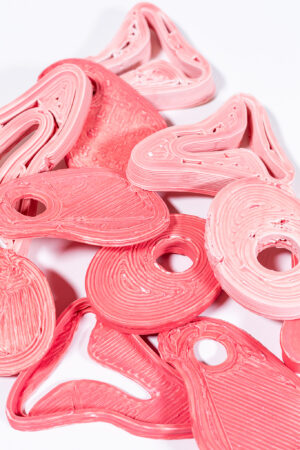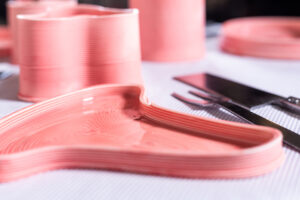
Die Weltbevölkerung ist auf etwa 8 Milliarden Menschen im Jahr 2023 angewachsen. Die Ernährungs- und Landwirtschaftsorganisation der Vereinten Nationen FAO schätzt die weltweit produzierte Fleischmenge im Jahr 2023 auf rund 363,9 Millionen Tonnen. Die Produktion von Treibhausgasen durch die Massentierhaltung hat enorme Auswirkungen auf unser Klima, und Millionen von Massentieren werden auf die respektloseste Art und Weise geschlachtet – aber hungrige Mäuler müssen gestopft werden.
Das „SONNTAGSBRATEN“ präsentiert ein Ensemble aus diskursiven Objekten, welche sich dabei an einer Art emotionalen Interaktion bedienen, die den Konsum, mögliche Entwicklungen in der Zukunft und unsere Sichtweise auf Fleisch kritisch hinterfragt und konfrontieren soll.
Das Ergebnis bewegt sich zwischen funktionalen Gebrauchsgegenständen und Installation, die das klassische Tischgedeck aufgreift. Durch Form, Farbe und Kontext werden bekannte und zugleich abstrakte Bilder geschaffen.
Die Ästhetik der Fleischteller und Trinkgefäße verweist auf eine spekulative Zukunft, in der Fleisch im Labor gezüchtet und 3D gedruckt wird und noch weiter von unserem Bewusstsein entfernt ist als heute – und stellt es als mögliche Alternative (?) zur herkömmlichen Fleischproduktion in Frage.
Dabei wurde eine Übersetzung in das Medium von 3D gedrucktem Porzellan benutzt, um innerhalb der Thematik auf der einen Seite ein traditionelles, wertvolles Material zu verwenden, dass eng mit unserer Esskultur verknüpft ist, auf der anderen Seite mit der Ästhetik von organischer Imperfektion und synthetischer, generischer Struktur und Perfektion zu spielt.
Das Hinzufügen von Besteck schafft eine Verbindung zu bekannten Schlachtwerkzeugen, welche wiederum auf den Ursprung des Fleisches verweisen und eine art symbolische Nähe schaffen, während dieses scharfe, unbequeme Besteck von den Essenden benutzt wird.
Das Projekt befasst sich auf konzeptionelle Weise mit unserer Beziehung zu Fleisch und Konsum im Allgemeinen und sollte als Gesprächsgegenstand zur kritischen Reflexion über unser Verhalten als Verbraucher, unsere Positionierung in diesem Bereich und unsere Verantwortung gesehen werden.
The world population has grown to about 8 billion in 2023. The United Nations Food and Agriculture Organisation FAO projected the amount of meat produced worldwide in 2023 to be around 363.9 million tonnes. The production of greenhouse gases through animal mass production has an enormous impact on our climate and and millions of mass bred animals are slaughtered in the most disrespectful way possible – but hungry mouths need to be fed.
„SONNTAGSBRATEN“ presents an ensemble of discursive objects that make use of a kind of emotional interaction that critically questions consumption, possible developments in the future and our view of meat and at the same time confronting the viewer.
The result moves between functional utilitarian objects and installation, which takes up the classic table setting. Through form, colour and context, familiar and at the same time abstract images are created.
The aesthetics of the meat plates and drinking vessels point to a speculative future in which meat is grown in the laboratory and 3D printed, and is even further removed from our consciousness than it is today – questioning it as a possible alternative (?) to conventional meat production.
A translation into the medium of 3D printed porcelain was used to play within the theme on the one hand using a traditional, precious material that is closely linked to our food culture, and on the other playing with the aesthetics of organic imperfection and synthetic, generic structure and perfection.
The addition of cutlery creates a link to familiar butchering tools, which in turn refer to the origin of meat and create a kind of symbolic proximity, while this sharp, uncomfortable cutlery is used by the diners.
The project deals in a conceptual way with our relationship to meat and consumption in general and should be seen as a conversation piece of critical reflection regarding our behaviour as consumers, how we position ourselfs within this field and what our responsibilities are.
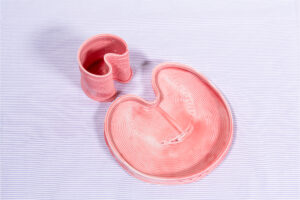

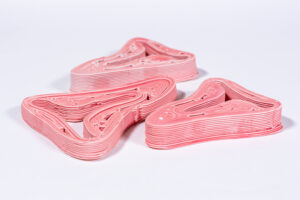
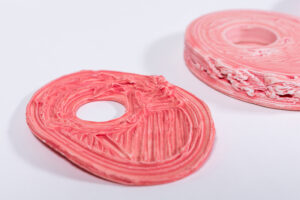

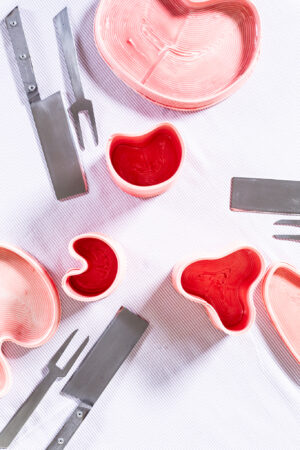
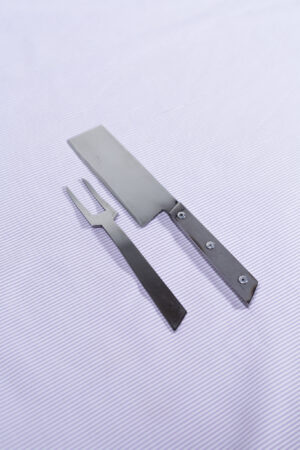

PROZESS
